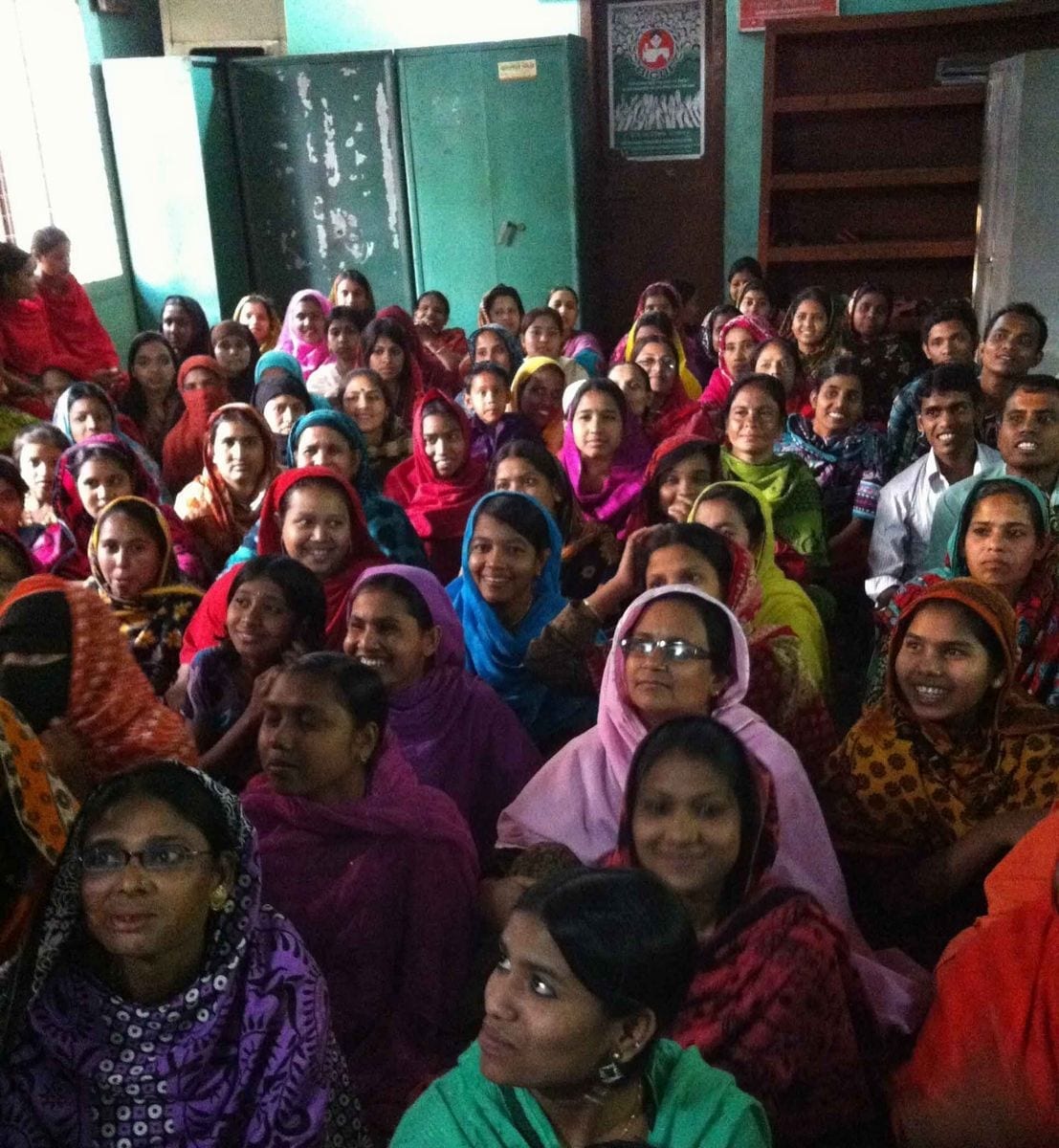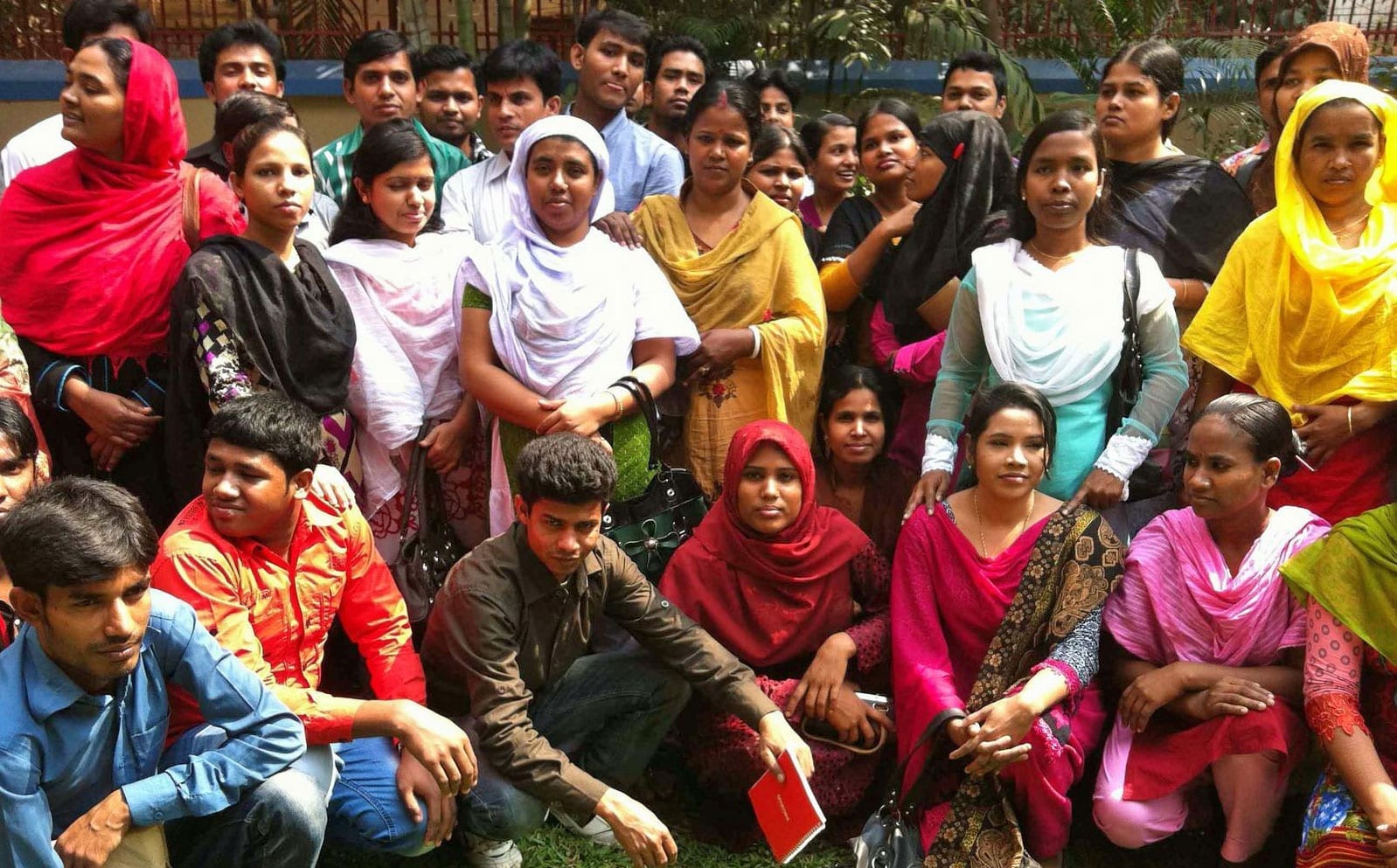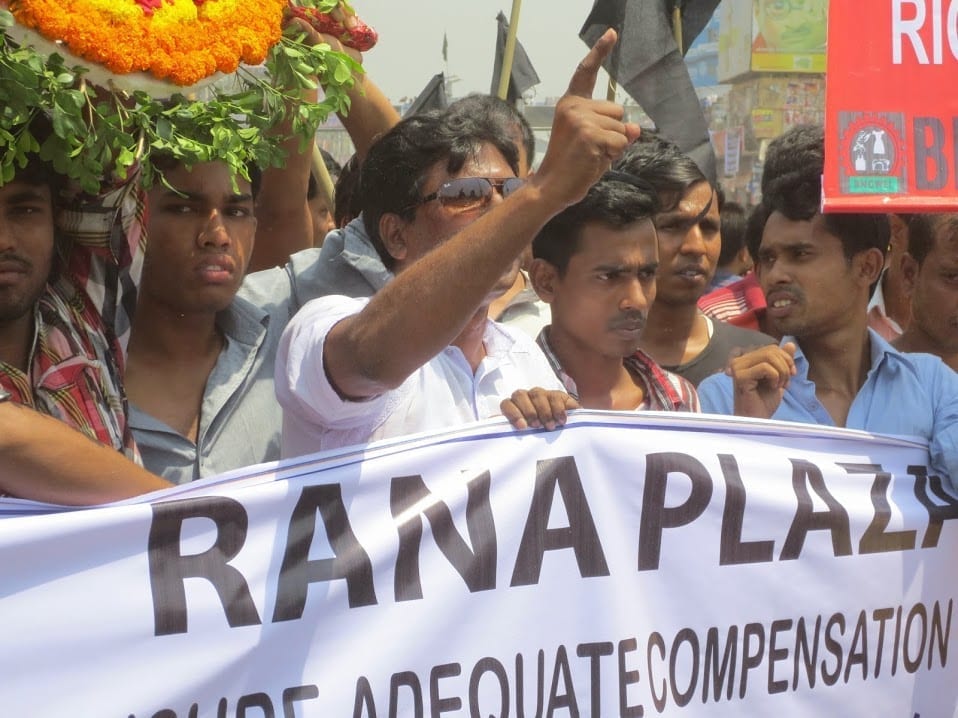
Mar 5, 2014
More than 400 Bangladesh garment workers and trade unionists rallied over the weekend at the National Press Club in Dhaka, the capital, to demand police take action to find perpetrators who beat and badly injured a garment worker leader and four union organizers last week. The group was talking with garment workers when they were attacked, and police subsequently refused to accept a report on the incident.
After rallying at the Press Club, union activists and their allies marched to the Ministry of Home Affairs, where staff received a small delegation of activists and accepted their letter calling for government officials to pursue justice for the victims. Later that night, police accepted the crime report from the victims of the violent attack, the prelude to beginning an investigation.
Participants in the rally and march include members and leaders of the Bangladesh Federation of Workers Solidarity (BFWS), where the injured organizers work, the Bangladesh Garments and Industrial Workers Federation (BIGUF), the Sommilito Garments Sromik Federation (SGSF), Bangladesh Garments and Industrial Sramik Federation (BGIWF) and the National Garment Workers Federation (NGWF).
The factory, which had been closed following a workers’ protest against the business not paying the minimum wage on February 18, was fully reopened on March 2. Some 30 workers now say they have been verbally terminated.

Feb 25, 2014
A Bangladesh garment worker leader and four union organizers, among them two women, were badly injured Saturday when about two dozen people beat, kicked and threw them to the ground as the five were speaking to workers in the dormitory where they live. One of the organizers was taken from the scene, beaten severely and dumped, unconscious, nearby. He and a female organizer remain in the hospital. The whereabouts of the garment worker are unknown.
According to several witnesses, the attack was carried out by factory managers and other men and women, some of them who worked for the factory, potentially paid to carry out the act—not an uncommon practice in the country. The women in the group were separated from the others and threatened with rape.
The organizers, all working with the Bangladesh Federation of Workers Solidarity, were supporting workers who had earlier approached the union for assistance and who had been fighting to be paid the minimum wage at their factory. The factory, which manufactures for Western brands, employs approximately 4,500 workers—many of who had staged a wage protest February 18, which was ultimately put down by police.
On Saturday, the organizers and activists from the factory floor signed up about 300 workers for a union before the attack occurred—though all the signed authorization cards were stolen during the assault.
Workers, activists and the Solidarity Center are calling for a thorough and vigorous investigation into the crime that brings the perpetrators to justice and shows that Bangladesh is unwilling to tolerate attacks on workers’ right to freedom of association.
The Solidarity Center is providing legal assistance and support for medical expenses for the injured organizers, and partners with the Bangladesh Federation of Workers Solidarity.

Jun 28, 2013
Workers in Bangladesh—especially millions of poorly paid garment workers who often risk their lives in dangerous factories—won a new tool to advance their rights when the United States suspended preferential trade benefits with the country.
Yesterday’s announcement that the United States suspended its Generalized System of Preferences (GSP) agreement with Bangladesh based on chronic and severe labor rights violations “is a rare and clear statement that affirms that worker rights and livelihoods are not expendable,” says Solidarity Center Executive Director Shawna Bader-Blau.
Because the benefits are suspended and not terminated, Bangladesh has the opportunity to again qualify for the GSP benefit by improving worker rights, laws and practices. A key measure of that program will be whether newly registered unions will be allowed to represent worker interests.
“Since 2005, over 1,800 workers have died in preventable factory fires and building collapses in the Bangladesh garment industry,” says AFL-CIO President Richard Trumka. “Workers died because the government and industry violated safety standards to cut costs, while global apparel brands demanded production at the lowest prices in the world. Bangladesh’s workers, many of them young women, need good jobs with strong worker protections, a voice at work and safe work places.”
Many of Bangladesh’s 4 million garment workers risk their lives every day, working in thousands of unregulated and often poorly constructed factories. Yet despite their contribution to the $19 billion garment industry, they are denied workplace rights and toil in workplace conditions reminiscent of the U.S. sweatshops of 100 years ago.
“This long-awaited decision is an important step for workers’ rights,” says International Trade Union Confederation (ITUC) General Secretary Sharan Burrow. “It sends a strong statement to all governments and employers that violation of the fundamental rights of workers will not be tolerated if a country expects to participate in the global economy.”
Although the Bangladesh government has for years talked about improving the situation for workers, in the past 15 months:
• Aminul Islam, a labor leader, was killed and his murder has gone unsolved.
• The Rana Plaza collapse killed more than 1,127 garment workers in April.
• The November Tazreen Fashions fire killed at least 112 garment workers.
• More than 45 fire incidents have occurred at Bangladeshi garment factories since Tazreen, according to data compiled by Solidarity Center staff in Dhaka, the capital.
The ITUC and AFL-CIO are calling on the government of Bangladesh to act urgently and deliberately to ensure that the rights of workers are respected in law and in practice. Bangladesh unions and worker rights advocates from around the world also are calling on corporations throughout the supply chain to sign and implement a binding agreement regarding workplace fire and building safety in Bangladesh.
The proposed Fire and Building Safety Agreement, already accepted by more than 60 major brands, guarantees worker participation, recognizes the role of government and takes measures to combat corruption by requiring rigorous inspections, transparent reporting of audits and public oversight of results.
For more than 15 years, the Solidarity Center has supported worker rights in Bangladesh.
Dec 4, 2012
Ten people were injured today after they were attacked by a mob of men wielding knives, sticks and rocks at the Tunisian Labor Federation (Union Générale Tunisienne du Travail UGTT) in the capital, Tunis.
As trade unionists held an overnight vigil to commemorate the 1952 assassination of Farhat Hached, UGTT founder and first general secretary, hundreds attacked the union’s offices, injuring participants, including two members of UGTT’s executive board. The attack was captured on amateur video.
“Today’s attack perpetrated against the UGTT is a second assassination of Farhat Hached,” said UGTT General Secretary Hassine Abassi, speaking on Shems FM, the UGTT radio station.
“The UGTT was never attacked like this during the time of (former presidents) Ben Ali or Bourguiba. We hold the current government responsible for this violence.”
Following the attacks, thousands of union members and supporters, including Solidarity Center staff, gathered in the city center and marched to Hached’s tomb to stand in solidarity with those injured and to denounce violence in a democratic society that respects values of equality and social justice.
UGTT’s offices were attacked in October, and union members and supporters rushed to barricade the doors. No one was injured. In June, the three regional UGTT office were damaged after being firebombed.
Hached was brutally murdered by a colonialist militia, a key event in Tunisia’s passage to independence.
The UGTT was recently honored by the AFL-CIO and received the George Meany-Lane Kirkland Human Rights Award for its fundamental role in supporting and sustaining the democratic uprising that took place in Tunisia in 2011.
Oct 10, 2012
The offices of the Tunisian Labor Federation (Union Générale Tunisienne du Travail, UGTT) in Tunis, Tunisia, were attacked at 8:45 a.m. today by up to 200 people wielding rocks and bottles. Union supporters, including a Solidarity Center staff member, rushed to the scene and barricaded entry to the offices. Ever since last year’s elections, the UGTT has been repeatedly targeted with vicious attacks from groups hostile to the union. Firebomb attacks during the night of June 11-12 damaged three UGTT offices in Bousalam, Bengarden and Jendouba.
As the attackers “tried to force their way into the building, they threw rocks and bottles,” said Mohamed Najjari, a member of the UGTT’s tourism workers federation. “I’m glad no one was hurt.”
After being pushed back from the union office, the attackers rallied in a nearby square, periodically sending someone to harangue the assembled UGTT activists. By then, the riot police had arrived and no further violence erupted.
The UGTT was recently honored by the AFL-CIO and received the George Meany-Lane Kirkland Human Rights Award for its fundamental role in supporting and sustaining the democratic uprising that took place in Tunisia in 2011.
Watch a Youtube video covering this morning’s violence.



